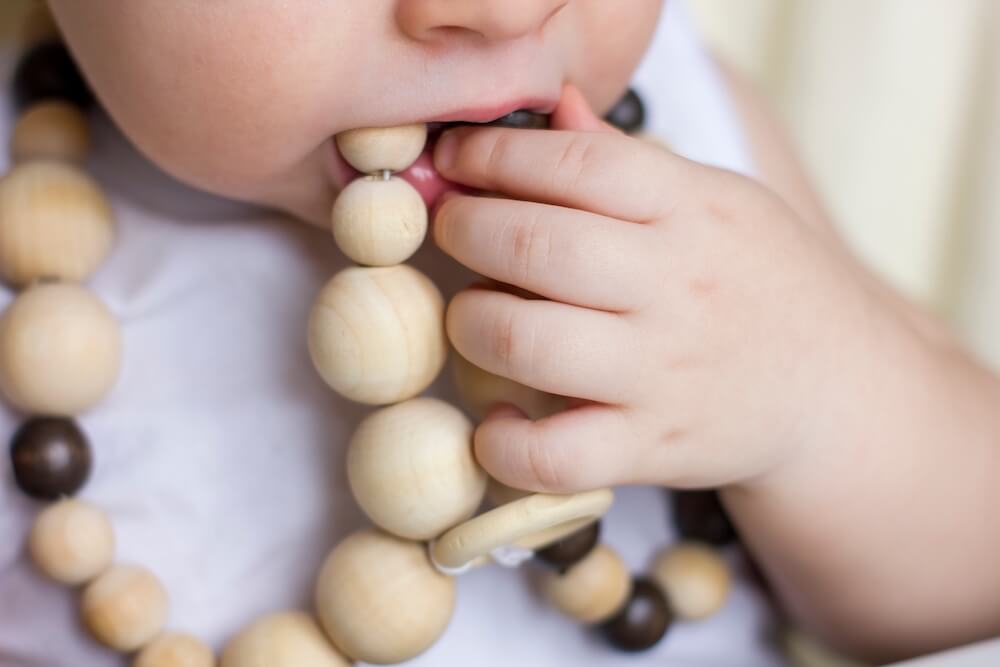As parents, we are always concerned about our children’s health and well-being. A common issue that parents may encounter is bruxism; when a baby is grinding their teeth.
This can be a worrisome behavior, but understanding its causes, signs, effects, and remedies can help parents better manage this condition and ensure their child’s oral health.
What is Bruxism?
Baby teeth grinding, or bruxism, refers to the act of grinding, gnashing, or clenching teeth in babies and young children. It is a common phenomenon that often occurs during sleep, but can also happen during waking hours. It may occur as early as infancy, but it is most commonly seen in toddlers and preschoolers.
Why is My Baby Grinding Their Teeth?
The exact causes of bruxism in babies are not fully understood, but there are several factors that may contribute to teeth grinding. According to the American Academy of Pediatrics (AAP), bruxism in children can be caused by a combination of physical, psychological, and genetic factors.
Some of the common causes of a baby grinding their teeth include:
- Teething: Teething is when a baby’s teeth start to emerge through the gums. It can be uncomfortable and painful, and some babies may grind their teeth as a way to alleviate the discomfort.
- Misaligned Teeth or Abnormal Bite: If a child’s teeth do not align properly or if they have an abnormal bite, it can lead to bruxism. Grinding their teeth may be a subconscious attempt to correct the misalignment or relieve the discomfort.
- Stress or Anxiety: Just like adults, children can experience stress or anxiety, which can manifest as teeth grinding. This can be related to changes in the child’s routine, such as starting school, moving to a new home, or experiencing emotional stress.
- Hyperactivity or Aggressive Behavior: Children who are hyperactive or exhibit aggressive behavior may also grind their teeth. This can be a way for them to release excess energy or express frustration.
- Sleep Disorders: Certain sleep disorders, such as sleep apnea or snoring, can also trigger bruxism in children. These conditions disrupt the child’s normal sleep pattern and can result in teeth grinding during sleep.
Download the Kinedu app to learn effective strategies to help your baby sleep through the night!
Signs and Effects of Bruxism in Babies
It is important for parents to be vigilant and recognize the signs of a baby grinding their teeth. Early detection can help prevent complications and minimize the effects of bruxism. Some common signs or effects that may indicate that a child is grinding their teeth include:
Grinding, gnashing, or clenching noises during sleep
Parents may hear their child grinding their teeth during sleep. This can be loud and may wake the child or disturb their sleep.
Dental problems
Over time, teeth grinding can cause visible wear and tear on a child’s teeth. Parents may notice flattened, chipped, or worn-down teeth.
The constant grinding and clenching of teeth can also cause dental issues such as tooth sensitivity, tooth enamel erosion, and even tooth fractures or chips.
These dental problems may require dental interventions such as fillings, crowns, or other dental procedures to restore the child’s oral health.
Jaw pain or facial pain
The excessive force applied to the jaw by teeth grinding can result in jaw pain, facial pain, headaches upon waking up or throughout the day, and even temporomandibular joint (TMJ) disorders. TMJ disorders can cause discomfort, difficulty in opening or closing the mouth, and may require medical attention for proper management.
Changes in sleep patterns or behaviors
Bruxism can disrupt a child’s normal sleep pattern, resulting in restless sleep, waking up at night frequently, or difficulty falling asleep. They may also have difficulty concentrating or paying attention, which can affect their performance in school or other activities. This can result in daytime sleepiness, irritability, and mood swings, which may affect the child’s behavior and overall quality of life.
Stress and anxiety
Bruxism in children can also be associated with stress and anxiety. Children who are experiencing emotional stress or anxiety may grind their teeth as a way to cope with their emotions. Addressing the underlying stressors or anxieties may help manage the teeth grinding behavior.
Remedies for a Baby Teeth Grinding
There are several remedies that may help manage and alleviate bruxism:
- Observation and reassurance: In most cases, a baby grinding their teeth is a self-limiting behavior that resolves on its own. Parents can observe and reassure their child, providing comfort and security during this stage.
- Lifestyle changes: Implementing lifestyle changes such as establishing a calming bedtime routine, creating a conducive sleep environment, managing stress and anxiety, providing a soft and safe chewing surface, avoiding stimulating activities before bedtime, ensuring proper hydration, and maintaining a healthy diet can help reduce the likelihood of teeth grinding.
- Mouthguard: In some cases, a dentist may recommend a mouthguard to protect the child’s teeth from the damaging effects of grinding. A custom-fitted mouthguard can be made by a dentist and worn during sleep to create a barrier between the upper and lower teeth and prevent further wear and tear.
- Addressing underlying health conditions: If teeth grinding is associated with other underlying health conditions or sensory issues, addressing and managing those conditions may help reduce the frequency and severity of teeth grinding.
- Medication: In rare cases, medication may be prescribed by a healthcare professional to manage teeth grinding, particularly if it is associated with underlying medical or neurological conditions.
When to Talk to Your Child’s Pediatrician
In most cases, a baby grinding their teeth is a common behavior that may resolve on its own without any medical intervention. However, it is important to consult a pediatrician or dentist if you notice any of the following:
- Severe tooth wear: If a child’s teeth show severe wear and tear due to grinding, it may require dental intervention to restore the tooth structure and prevent further damage.
- Frequent complaints of jaw pain or facial pain: Persistent or recurrent jaw pain, facial pain, or headaches associated with teeth grinding may require medical evaluation and management to address any underlying issues.
- Sleep disturbances: If a child’s sleep pattern is consistently disrupted due to teeth grinding, it may impact their overall health and well-being. Consulting a pediatrician or a sleep specialist may be necessary to address the sleep disturbances and provide appropriate interventions.
- Behavioral changes: If a child’s behavior, mood, or performance at school is consistently affected by teeth grinding, it is important to seek medical advice to address any underlying causes and manage the behavioral changes.
In conclusion, bruxism is a common behavior among infants and young children that typically resolves on its own. It may be caused by various factors such as teething, jaw misalignment, stress, or sensory issues.
Recognizing the signs of teeth grinding, understanding its effects on sleep, behavior, and health, knowing when to call the doctor, being aware of potential complications, and implementing remedies and soothing measures can help manage and alleviate this condition.
If you have concerns about your baby’s teeth grinding behavior or its impact on their health and well-being, it is important to consult a pediatrician or dentist for proper evaluation and recommendations.
With appropriate care and attention, most cases of baby teeth grinding can be effectively managed and the child can go on to develop healthy oral habits as they grow. For expert guidance on teething remedies and baby sleep, be sure to download the Kinedu app.








